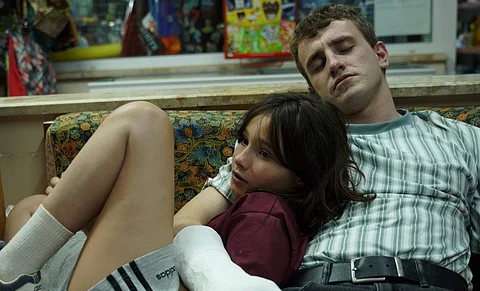

It’s inevitable to write on the tenderly crafted but agonizing Aftersun in the week it drops on Mubi. Charlotte Wells’ debut feature has intrinsic integrity as a near-perfect depiction of imperfect lives. But the compendium of the 11-year-old Sophie’s (Frankie Corio) memories of a vacation with her father Calum (Paul Mescal) in Turkey on the eve of his 31st birthday also dredges out personal remembrances in viewers. Perhaps unrelated but just as aching, buried deep in the recesses of the mind to ward off vulnerabilities.
It is like going on an intimate journey that exposes us to ourselves from the safety of our camouflages, each viewing like an admission of newer, secluded susceptibilities within us. Aftersun is plentiful and artistic, but it also teems with the experiences we bring to it individually. I haven’t felt the sense of dread in cinema as much as I did in an early sequence. With the hand in the cast, Calum is smoking and practising ninja moves on the hotel room's balcony. Sophie is sleeping on the bed inside. We hear her breathing heavily. As the morning breaks, it merges with the sound of his breath. There is nothing scary about this progression on the surface. But Wells arranges and builds up the regular in a disconcerting manner. A sign of the ominous, never fully spelt out but always palpable.
Then on, this unsettling feeling refuses to leave throughout the entire film. Even something as ordinary as Calum rubbing sunscreen on his “poppet” or wiping her face and asking if her relationship with her mother is on the course, or she claiming to her mother that dad has been amazing, comes with a sense of foreboding. It hits the hardest in his cussed insistence on teaching her self-defence so that she can get by on her own in the big bad world. Or in the moving conversation about the shared sky and the comfort in knowing that both father and daughter can see the sun and feel togetherness even when they are not in the same place. It’s a wrenching marker of estrangement just as it presages the ephemerality of the bonding that leads to eventual separation. Will Sophie be able to visit Calum in his home outside London, where he’ll have a room painted yellow, just for her and for the sun that binds them so close?
It’s not the big drama but these little moments—and all that lies between experiencing, recording, and replaying them—that adds up to dwell on life’s transience and the fundamental fear of impermanence. The happiness of a holiday is meant to be short-lived. You can’t live in hotels all your life after all. The I love you, goodbye, and the last dance to “Under Pressure”, whose finality you can only realize in retrospect. Wells makes Calum emerge gradually through the cracks while we put little pieces of his portrait together. A man whose parents didn’t remember his birthday when he was a child. Someone who doesn’t feel a sense of home and belonging in the place he grew up. A man who has no money. A man in inexplicable pain, howling alone in the night. “Live wherever, be whoever,” he tells Sophie, “You have time.” But is shocked at himself for making it to his 30s and can’t imagine being in his 40s.
Aftersun is a searing parent-child portrait where the role-playing of the two intermingles with an overwhelming sadness. He abandons her while she tries to find him. There is tremendous love and affection yet a distance. A seemingly simple question—“when you were 11 years old, what did you think you’d be doing now”—comes loaded with meaning as it coalesces both the past and the future in the present, turns the parent into a child, just as it foresees the child as a parent. A throwaway moment has young Sophie talking of an amazing day ending with her feeling bone tired. As she confesses to that sinking feeling, there’s the unspoken dread looming large—has she inherited the afflictions of her father?
Aftersun can be momentarily cathartic in making us confront the troubling ghosts of our past that tend to define our present. But it doesn’t offer the false promise of healing in the future. The harsh truth it leaves us with is the impossibility of closure when it comes to people and relationships. All we can do is keep negotiating and try to understand. Sometimes even in the afterlife when we may not be sharing the sun and sky with each other anymore.